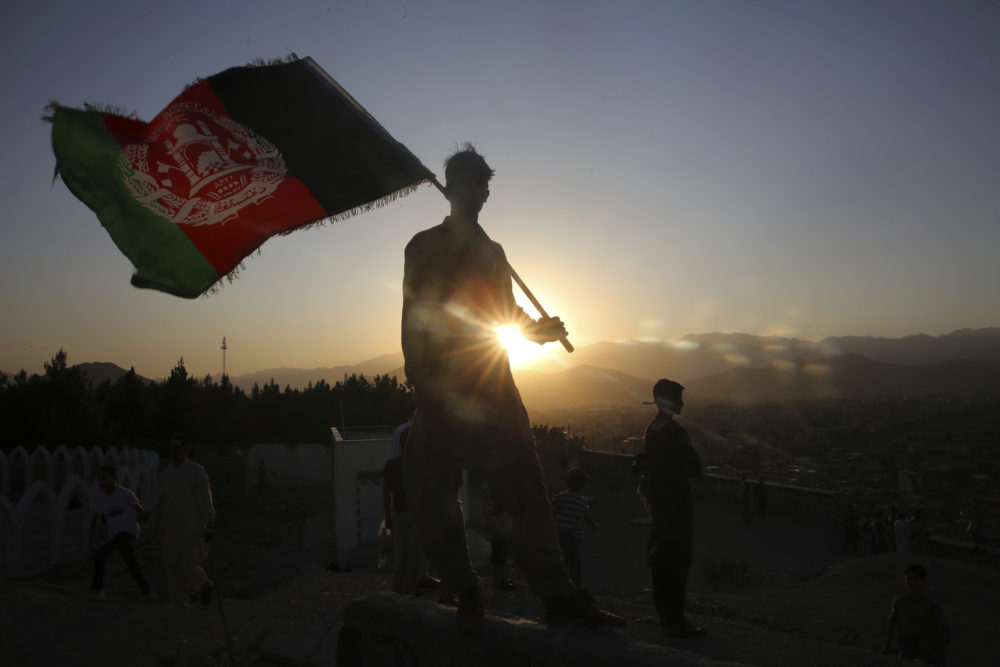Advertisement
Commentary
18 Years On, What We Should Learn From The War In Afghanistan

The Trump Administration is looking for the exit door out of Afghanistan. After 18 years, our longest-ever war has morphed from a manhunt for Osama bin Laden into nation-building. Two sticky questions bedevil negotiators: How quickly can the 14,000 remaining American troops and several thousand allied soldiers leave? And how can we ensure the Taliban makes good on its pledge to not to reprise Afghanistan’s pre-9/11 role as a hatchery for terrorism?
Any deal we strike won’t ensure peace between the Taliban and the U.S.-backed Afghan government, nor guarantee the Taliban will respect all Afghans’ rights. And it won’t prevent horrors like the ISIS suicide bombing that killed 63 and injured 180 at a Kabul wedding Saturday, on the eve of the nation's 100th Independence Day.
Desirable as these things are, they’re beyond our power to deliver. They also aren’t essential to our national security, an observation that, along with the staggering costs of this war, demands that the United States and the presidential candidates answer another question going forward:
What is worth our fighting for?
The temptation to build an empire, and arguments for resisting it, have been in opposition since antiquity. The Greek historian Thucydides wrote a first-hand account before ancient Athens’ disastrous effort to subjugate Sicily during the Peloponnesian War. Unlike Athens, the United States doesn’t nurture explicit imperial designs. But the U.S. experience in Afghanistan has demonstrated how a country can don the trappings of empire — if and when it comes to regard any development in any corner of the world as a potential threat demanding intervention.
Voters should press 2020 presidential candidates to tell us when they would fight and when they’d stand down.
The U.S. invasion in October 2001 was forced on us by the Taliban’s refusal to hand over Osama bin Laden. But he’s dead now eight years. Some 3,500-plus American and coalition soldiers and tens of thousands of Afghans have perished. Our failure to bring peace to Afghanistan adds it to Vietnam, Iraq and Libya among American interventions that backfired.
The job of a commander in chief, and indeed any statesman, is to distinguish between vital interests demanding we send in the Army versus those that might be nice, but not necessary. This is what Stephen Kinzer, a former foreign correspondent and senior fellow at Brown’s Watson Institute for international affairs, argues. He believes that we’ve often botched that distinction.
Meddling in another country’s governance not only can be immoral, it weakens the country that meddles. That case was made at least as far back as 415 B.C.E., when the Athenian general Nicias tried to dissuade his city-state, already atop a restless empire and at odds with Sparta, from invading Sicily.
Advertisement
“You leave many enemies here behind you, and more you endeavor to draw hither,” Thucydides quotes Nicias telling the Athenian assembly. “When they shall hear that our power is distracted, which is the thing we now hasten to do, they will be glad to join in the war with the Sicilians against us.”
Nicias lost the debate. Athens suffered catastrophic defeat in Sicily and ultimately fell to Sparta.
Millennia later, Afghanistan resists our power as stubbornly as the Sicilians resisted Athenians. Kinzer, who wrote a book about the roots of “American Empire” suggests sensible guardrails for determining the necessity of our military commitments:
It is in our vital interest to assure that the United States is never attacked with weapons of mass destruction; that wars on other continents not spread onto our territory; that we maintain global trade routes on which our prosperity depends; that no hegemonic power on another continent becomes so strong that it threatens us in the Western Hemisphere; and that climate change does not disrupt our national life. To those vital interests I would add just one more: looking good to others. One of America’s great strengths is the soft power of our example. Not many people in the world consider China, Russia, or Saudi Arabia to be inspiring models. Great numbers admire the United States. This pro-American sentiment is an enormous strategic asset for us.
These reasons surely are worth fighting for, if diplomacy can’t resolve them. I’d add one more: Kinzer argues that the 1994 Rwandan genocide, involving no vital American interest but horrific in its savagery, could have been averted by other nations. Fair enough. But if other nations won’t act, and the U.S. can avert the slaughter of innocents at minimal risk to ourselves, we should consider intervention on a case-by-case basis.
Otherwise, Kinzer outlines sage constraints on military adventurism. Donald Trump has condemned endless wars, is trying to exit Afghanistan, and has leaned on allies to spend more on their own defense. But contrary moves — his bloated defense budgets, his regular practice of insulting allies, and needless confrontation with Iran — suggest, in the words of one foreign affairs expert, that he “has no foreign policy. He only has impulses.”
Voters should press 2020 presidential candidates to tell us when they would fight and when they’d stand down. The lives of our men and women in uniform, and our tax dollars, hang on the wisdom uttered two centuries ago by John Quincy Adams, who as secretary of state said: while we support freedom everywhere, America “goes not abroad in search of monsters to destroy.”
